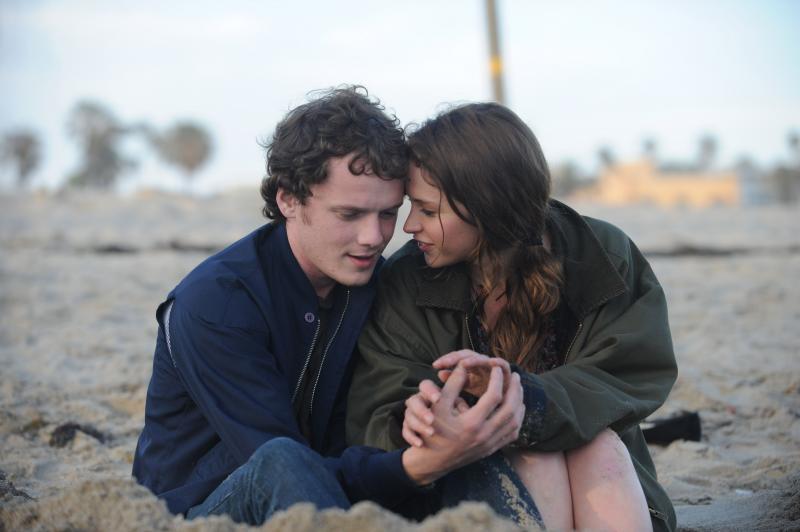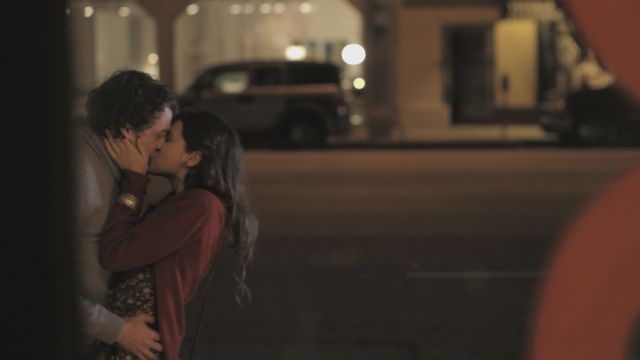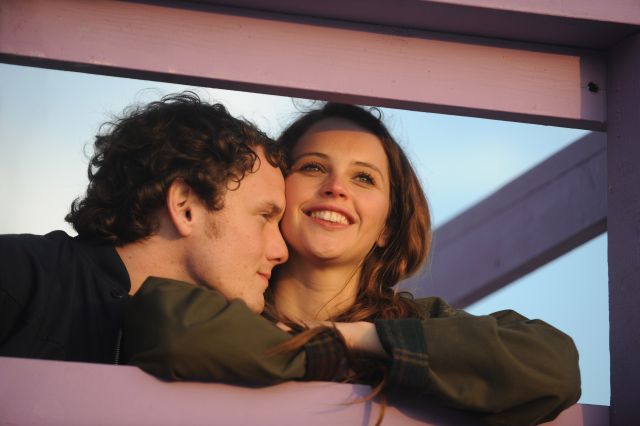Like Crazy | reviews, news & interviews
Like Crazy
Like Crazy
Love hurts in Drake Doremus's deeply affecting Sundance Festival favourite

Romance follows a recognisably rocky path, and visa issues don't help much either, in Like Crazy, a small but seriously affecting movie that is sure to hit many filmgoers where they live. An Anglo-American tale of love's vagaries that doesn't follow the expected Hollywood arc, Drake Doremus's 2011 Sundance Film Festival darling raises niggling questions on various plot details while getting the large-scale issues right.
The title refers specifically to an inscription that Jacob (Anton Yelchin) has carved on the bottom of a chair that he has made for Anna (Felicity Jones), not long after the young American furniture design student has fallen hard for the English classmate in his media studies class on an unnamed Los Angeles campus. She slides a note under the windscreen wiper of his car, a café rendezvous ensues, and before long they're sharing an affection for Paul Simon's Graceland and for one another.
 So far so sweet, you might think, but also so generic, which is to misunderstand the strategies of all concerned. Shot with an outline of the trajectory of the narrative but without an actual fully-fledged script, Like Crazy possesses something of the genuinely improvisatory flavour of what most of us call life. Doremus's method allows his camera as often as not to do the work of words, the couple's burgeoning relationship caught in a wonderful sequence of purely visual vignettes (pictured above and below) that tells us infinitely more than any amount of spoken soppiness (hello, One Day) could ever convey.
So far so sweet, you might think, but also so generic, which is to misunderstand the strategies of all concerned. Shot with an outline of the trajectory of the narrative but without an actual fully-fledged script, Like Crazy possesses something of the genuinely improvisatory flavour of what most of us call life. Doremus's method allows his camera as often as not to do the work of words, the couple's burgeoning relationship caught in a wonderful sequence of purely visual vignettes (pictured above and below) that tells us infinitely more than any amount of spoken soppiness (hello, One Day) could ever convey.
What gets in the way? Not terminal illness or anything as grimly defining, though the obstacles posed by bureaucracy loom pretty large. (Anna deliberately overstays her visa, a shared decision from which the couple's initially carefree rapport never fully recovers.) But the film is smart enough to suggest that the two might not actually be ideal soulmates even without immigration hurdles throwing obvious obstacles in their path. Jacob hops on a plane to London following Anna's return home only to find that he doesn't particularly mesh with her friends, not long before she remarks that "it's hard to keep stopping and starting" - which is then precisely what their relationship, a Camden Town Hall wedding included, goes on to do.
 Like Crazy is as evocative for what it doesn't dramatise as for what it chooses to include. On the outs with one another, both Anna and Jacob pursue liaisons elsewhere, and yet Doremus is less interested in the inevitable revelations and showdowns than he is in those more intimate encounters that often get left out. A shower scene late on, for instance, gradually acquires a tension that doesn't need language to announce itself. To that extent, the movie acquires the kind of quiet resonance one associates with the likes of Eric Rohmer, which isn't the first connection you'd make with a filmmaker (Doremus) whose previous credits include a 2010 entry called Douchebag.
Like Crazy is as evocative for what it doesn't dramatise as for what it chooses to include. On the outs with one another, both Anna and Jacob pursue liaisons elsewhere, and yet Doremus is less interested in the inevitable revelations and showdowns than he is in those more intimate encounters that often get left out. A shower scene late on, for instance, gradually acquires a tension that doesn't need language to announce itself. To that extent, the movie acquires the kind of quiet resonance one associates with the likes of Eric Rohmer, which isn't the first connection you'd make with a filmmaker (Doremus) whose previous credits include a 2010 entry called Douchebag.
The film has other people in it, not least a lively Alex Kingston (who went on from this to share a stage with Jones last summer courtesy the Donmar's Luise Miller), and Charlie Bewley scores in his eleventh-hour turn as the beau who will never replace Jacob in Anna's anxious heart. But Like Crazy belongs as it must to its two always natural, ever-engaging leads, Yelchin's charmingly recessive Jacob nicely paired with Jones's round-cheeked allure. In the end, you feel for both characters not because life won't go on - it will: melodrama this is not - but because they seem both beautifully and ruinously matched, in turn. Sounds crazy, no? Not in a film this wise.
Watch the trailer for Like Crazy
The future of Arts Journalism
You can stop theartsdesk.com closing!
We urgently need financing to survive. Our fundraising drive has thus far raised £49,000 but we need to reach £100,000 or we will be forced to close. Please contribute here: https://gofund.me/c3f6033d
And if you can forward this information to anyone who might assist, we’d be grateful.

Subscribe to theartsdesk.com
Thank you for continuing to read our work on theartsdesk.com. For unlimited access to every article in its entirety, including our archive of more than 15,000 pieces, we're asking for £5 per month or £40 per year. We feel it's a very good deal, and hope you do too.
To take a subscription now simply click here.
And if you're looking for that extra gift for a friend or family member, why not treat them to a theartsdesk.com gift subscription?
more Film
 Eight Postcards from Utopia review - ads from the era when 1990s Romania embraced capitalism
Radu Jude's documentary is a mad montage of cheesy TV commercials
Eight Postcards from Utopia review - ads from the era when 1990s Romania embraced capitalism
Radu Jude's documentary is a mad montage of cheesy TV commercials
 The Kingdom review - coming of age as the body count rises
A teen belatedly bonds with her mysterious dad in an unflinching Corsican mob drama
The Kingdom review - coming of age as the body count rises
A teen belatedly bonds with her mysterious dad in an unflinching Corsican mob drama
 Weapons review - suffer the children
'Barbarian' follow-up hiply riffs on ancient fears
Weapons review - suffer the children
'Barbarian' follow-up hiply riffs on ancient fears
 theartsdesk Q&A: filmmaker Dag Johan Haugerud on sex, love, and confusion in the modern world
The writer-director discusses first-love agony and ecstasy in 'Dreams', the opening UK installment of his 'Oslo Stories' trilogy
theartsdesk Q&A: filmmaker Dag Johan Haugerud on sex, love, and confusion in the modern world
The writer-director discusses first-love agony and ecstasy in 'Dreams', the opening UK installment of his 'Oslo Stories' trilogy
 Oslo Stories Trilogy: Dreams review - love lessons
First love's bliss begins a utopian city symphony
Oslo Stories Trilogy: Dreams review - love lessons
First love's bliss begins a utopian city symphony
 Blu-ray: Two Way Stretch / Heavens Above!
'Peak Sellers': two gems from a great comic actor in his prime
Blu-ray: Two Way Stretch / Heavens Above!
'Peak Sellers': two gems from a great comic actor in his prime
 Late Shift review - life and death in an understaffed Swiss hospital
Petra Volpe directs Leonie Benesch in a compelling medical drama
Late Shift review - life and death in an understaffed Swiss hospital
Petra Volpe directs Leonie Benesch in a compelling medical drama
 The Naked Gun review - farce, slapstick and crass stupidity
Pamela Anderson and Liam Neeson put a retro spin on the Police Squad files
The Naked Gun review - farce, slapstick and crass stupidity
Pamela Anderson and Liam Neeson put a retro spin on the Police Squad files
 theartsdesk Q&A: actor Lars Eidinger on 'Dying' and loving the second half of life
The German star talks about playing the director's alter ego in a tormented family drama
theartsdesk Q&A: actor Lars Eidinger on 'Dying' and loving the second half of life
The German star talks about playing the director's alter ego in a tormented family drama
 The Fantastic Four: First Steps review - innocence regained
Marvel's original super-group return to fun, idealistic first principles
The Fantastic Four: First Steps review - innocence regained
Marvel's original super-group return to fun, idealistic first principles
 Dying review - they fuck you up, your mum and dad
Family dysfunction is at the heart of a quietly mesmerising German drama
Dying review - they fuck you up, your mum and dad
Family dysfunction is at the heart of a quietly mesmerising German drama
 theartsdesk Q&A: director Athina Rachel Tsangari on her brooding new film 'Harvest'
The Greek filmmaker talks about adapting Jim Crace's novel and putting the mercurial Caleb Landry Jones centre stage
theartsdesk Q&A: director Athina Rachel Tsangari on her brooding new film 'Harvest'
The Greek filmmaker talks about adapting Jim Crace's novel and putting the mercurial Caleb Landry Jones centre stage

Add comment